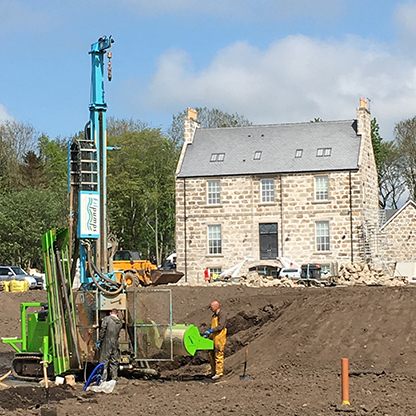
Benefits
• Environmentally friendly
• Better water
• Cost effective
• Money saving
• One stop shop
Drilling a borehole for private water supplies Scotland.
We can undertake any work on private water supplies, from the initial installation, water analysis, drilling for water to maintenance on an existing supply in Scotland, Highlands and Islands.
Private water supplies in Scotland are beneficial to commercial and industrial users who use large quantities of water. This can impact massively on costs, as without water rates to pay, the only cost incurred is the cost of the electricity in running the system.
What is a borehole?
A borehole is basically a modern version of a well, but smaller, easier to maintain and less likely to be at risk of outside contaminants. Find out more about Boreholes vs Traditional water supplies here.
As an alternative to a mains supply, a borehole provides you with a water source to use as pure drinking water, or for many other purposes (eg irrigation, etc)
Borehole water is normally of high quality, to ensure this we provide water testing from a specialist lab and recommend annual testing for domestic properties (by law public use properties must be tested annually). This allows you to ensure that the quality of the water, or to adjust your system with the necessary water filtration and treatment to combat any changes. Find out more about water testing here.
What are the benefits?
We can help you decide if a borehole supply is the right option for your property/business - get in touch to discuss.
Environmentally Friendly - boreholes use water taken from an underground source (eg an aquifer), rather than draining above ground supplies such as rivers.
Better Water - borehole water is free from surface pollutants. Filpumps supply filters and water treatment (if required) to allow you to always enjoy drinking water at it’s purest.
Cost Effective - a borehole can generate a fast return on investment, within an acceptable pay back period.
Money Saving - as borehole water usage is not metered, you will make a saving on water rate charges.
One stop shop - Filpumps can provide you with a complete and high quality service, from initial consultation, sourcing the best position onsite for your borehole (we can recommend a water diviner if you require this), onsite drilling, water pumps and even filters and water treatment - taking you from the initial idea right up to usage.
Introduction to water supplies
Installing a borehole water supply is a large investment and it is therefore essential that the project is properly managed and the equipment is of good quality and professionally installed. The following notes outline the main steps required to ensure that a reliable and wholesome water supply is achieved.
THE PROCESS

 Site Survey
Site Survey
A site survey is required to establish the optimum position for drilling. This is best derived by using a combination of two skills, the scientific geological survey and the traditional water divining.
Geological Survey- The British Geological Survey will search their records for soil and rock types to establish the most likely position for drilling. This will be backed up by any historical reports from drilling activity in this area.
Water Divining - Finally a water diviner will visit the site and pin point the exact position for drilling based on the geological information and the results of the divining.
 Estimate
Estimate
Filpumps will provide an estimate of the projected costs of the project.
 Well Drilling
Well Drilling
A six-wheel drive drilling rig is brought to site and used to drill a borehole 150mm (6 inches) diameter to a minimum depth of 30m (100ft). This will penetrate the overlying soils and enter the bedrock which contains the aquifer (water supply).
 Well Completion / Yield
Well Completion / Yield
During drilling it is possible to get a reasonable estimate of water yield. If this is satisfactory the well is then lined with a 150mm diameter ‘filter screen’, which is a rigid plastic pipe which is heavily perforated at its lower levels. This prevents rock debris caused by the drilling from falling into the well, preventing insertion/removal of the pump and also serves to protect the pump impellor from rock fragments. A rigid steel casing is driven into the upper section of the well to exclude the ingress of potentially contaminated surface water/debris.
 Borehole Testing / Test Pumping
Borehole Testing / Test Pumping
Once the well has been completed it is essential to test the performance before proceeding with further capital expenditure. This will establish the two main elements of viable supply
Water quality
Water quantity
First the well is ‘proved’ by pumping continuously to waste for a set period of time, allowing the aquifer to settle and the silt and grit caused by drilling to be removed.
Once the well has been proved a flow test is carried out to British Standard BS6316 to establish the likely yield which allows the pump to be sized accurately. Finally a water sample is taken and tested.
 Pump & Treatment System Installation
Pump & Treatment System Installation
Once the borehole hasbeen drilled and the test pumping completed, Filpumps can complete your system with pump installation and water treatment if necessary. The site is finally completed when the pumps are hooked up to the discharge pipework, electrics and controls.
The requirement for water treatment cannot be guessed and will rely upon the results of the water analysis. However as a precautionary measure it would be prudent to install some form of microbiological sterilant using UV sterilisation. The main advantage of UV sterilisation is that the water in unaltered in chemical composition or taste and sterilises the microbes as water is pumped through it.